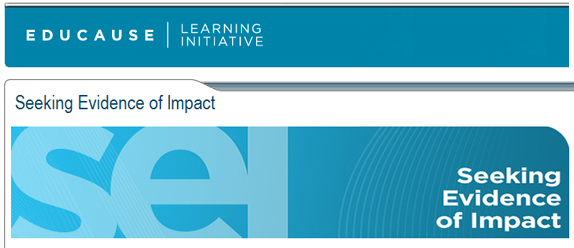From http://www.educause.edu/ELI/EDUCAUSELearningInitiative/SeekingEvidenceofImpact/206622
As the pace of technology change continues unabated, institutions are faced with numerous decisions and choices with respect to support for teaching and learning. With many options and constrained budgets, faculty and administrators must make careful decisions about what practices to adopt and about where to invest their time, effort, and fiscal resources. As critical as these decisions are, the information available about the impact of these innovations is often scarce, uneven, or both. What evidence do we have that these changes and innovation are having the impact we hope for?
What are the current effective practices that would enable us to collect that evidence? With the advent of Web 2.0, the themes of collaboration, participation, and openness have greatly changed the teaching and learning landscape. In light of these changes, what new methods for collecting evidence of impact might need to be developed?
Established practices and good data have made inroads in these areas. Often, however, they are scattered, disconnected, and at times in competition, making it challenging for the teaching and learning community to discover and compare their merits. Bringing these practices together and encouraging the invention of new ones will enable more institutions to measure impacts and produce data, providing a richer, evidence-based picture of the teaching and learning landscape on both the national and international level. The ELI announces a program intended to bring the teaching and learning community into a discussion about ways of gathering evidence of the impact of our innovations and current practices.
We hope to bring all types of higher education institutions and professional associations into a conversation on this theme. We envision an inclusive discussion that includes faculty members, instructional support professionals, librarians, students, and research experts in a collaborative exchange of insights and ideas.
Join us as we
- Catalyze new collaborations to advance evidence-based applications of learning innovation to benefit higher education practices
- Initiate a collective exploration that will serve to reinvigorate the community’s enthusiasm for and dedication to the task of identifying evidence of impact
- Enable participants to become (re)acquainted with a variety of current effective practices, so they can make appropriate choices about which ones to adopt locally
- Encourage the teaching and learning community to explore and discover options for new ways of gathering evidence
- Inaugurate ongoing dialogues, projects, and collaborations that help to enable institutions to effectively gather and share evidence of impact
Established practices and good data have made inroads in these areas. Often, however, they are scattered, disconnected, and at times in competition, making it challenging for the teaching and learning community to discover and compare their merits. Bringing these practices together and encouraging the invention of new ones will enable more institutions to measure impacts and produce data, providing a richer, evidence-based picture of the teaching and learning landscape on both the national and international level. The ELI announces a program intended to bring the teaching and learning community into a discussion about ways of gathering evidence of the impact of our innovations and current practices.
We hope to bring all types of higher education institutions and professional associations into a conversation on this theme. We envision an inclusive discussion that includes faculty members, instructional support professionals, librarians, students, and research experts in a collaborative exchange of insights and ideas.
Join us as we
- Catalyze new collaborations to advance evidence-based applications of learning innovation to benefit higher education practices
- Initiate a collective exploration that will serve to reinvigorate the community’s enthusiasm for and dedication to the task of identifying evidence of impact
- Enable participants to become (re)acquainted with a variety of current effective practices, so they can make appropriate choices about which ones to adopt locally
- Encourage the teaching and learning community to explore and discover options for new ways of gathering evidence
- Inaugurate ongoing dialogues, projects, and collaborations that help to enable institutions to effectively gather and share evidence of impact









